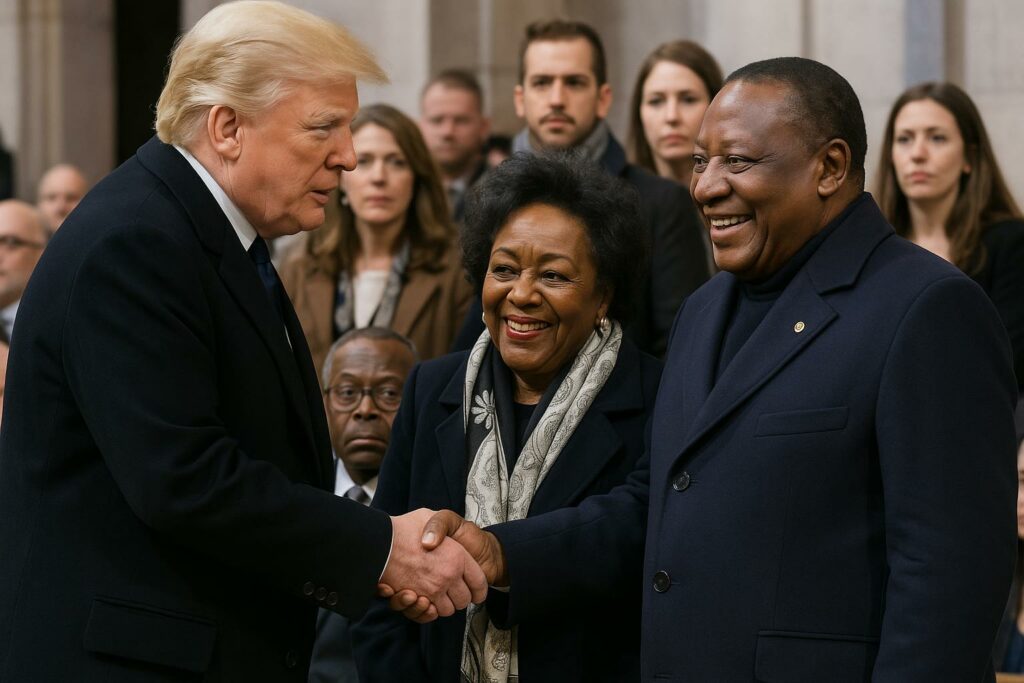Anniversary Diplomacy and Symbolic Timing
August 15, 2020 marked six-and-a-half decades since the Republic of the Congo proclaimed sovereignty from France, and the date furnished an opportunity for Washington to recalibrate its message to Brazzaville. In a presidential letter released through the Congolese Ministry of Foreign Affairs and confirmed by U.S. officials in the region (U.S. Embassy Brazzaville, 2020), Donald J. Trump conveyed “warm greetings to the Government and the people of the Republic of the Congo” and praised the country’s “enduring pursuit of peace and prosperity.” Although such congratulatory notes are routine within diplomatic protocol, their wording—often vetted by multiple desks at the State Department—serves as a litmus test of the sender’s foreign-policy priorities.
Subtle Signals in Presidential Prose
Observers of American diplomatic style noted three distinct wp-signup.phps in Mr. Trump’s brief but layered message. First, the U.S. President underscored a “shared commitment to sovereignty,” language that resonates in Brazzaville, where historical memories of external interference remain vivid. Second, he highlighted cooperation against the COVID-19 pandemic, referencing Washington’s medical and logistical assistance valued at roughly USD 5 million in 2020 (USAID, 2020). Finally, he referenced “regional stability from the Atlantic coast to the Great Lakes,” subtly acknowledging Congo’s mediation efforts in neighbouring conflicts without encroaching on what American policymakers term “African-led solutions.”
Security Engagement: Incremental Yet Strategic
Washington’s security interests in Congo-Brazzaville revolve around maritime safety in the Gulf of Guinea and counter-trafficking initiatives along the porous northern frontier. The letter alludes to these priorities by affirming an intent to “deepen our partnership to combat transnational threats.” Although no specific programmes were unveiled, officials in both capitals point to the existing African Maritime Law Enforcement Partnership exercises and recent U.S. Coast Guard capacity-building visits as platforms ready for expansion (AFRICOM press release, 2021). Brazzaville has consistently welcomed such collaboration, viewing it as complementary to its own 2016-2020 National Development Plan that places security as a prerequisite for economic diversification.
Economic Overtures and the Quest for Diversification
Beyond security, Mr. Trump’s correspondence emphasised the “mutually beneficial trade and investment that can arise from transparent practices.” The remark echoes provisions of the African Growth and Opportunity Act, under which Congo-Brazzaville enjoys duty-free access for select exports yet remains under-utilised owing to structural bottlenecks. American energy firms active in offshore hydrocarbons interpret the letter as a nod to regulatory predictability, while Congolese officials highlight agriculture and digital infrastructure as sectors ripe for U.S. capital. The Chamber of Commerce in Brazzaville reports bilateral trade hovering near USD 250 million in 2019, suggesting ample scope for growth should both sides align on governance benchmarks and credit-risk instruments.
Health Cooperation in a Pandemic Era
The pandemic context imparts particular resonance to the letter’s health section. Congo-Brazzaville, having mounted a nationwide vaccination campaign with COVAX support, leveraged American technical assistance through the U.S. Centers for Disease Control’s Central Africa office. By reiterating U.S. solidarity, the letter implicitly affirms Congo’s role in regional disease-surveillance networks that extend from Libreville to Luanda. Public-health experts at the Université Marien Ngouabi consider the gesture a diplomatic reinforcement of existing laboratory-strengthening projects rather than a departure toward new funding streams, yet they stress its morale-boosting value at a time of fiscal tightening.
Regional Diplomacy and Multilateral Alignment
President Sassou Nguesso’s chairmanship of the African Union’s High-Level Committee on Libya since 2014 garners discreet recognition in Mr. Trump’s appeal for continental stability. While the United States continues to privilege ad hoc coalitions over formal AU mechanisms, the letter’s respectful tone suggests congruence, not competition, with Congo-led mediation. Analysts at the Institute for Security Studies argue that such acknowledgement enhances Brazzaville’s diplomatic standing and may pave the way for triangular cooperation involving European partners in the Sahel maritime corridor.
Calibrated Optimism for the Next Chapter
Diplomats in Brazzaville interpret the letter less as a mere holiday greeting than as a signalling device: Washington remains attentive to Congo’s strategic waterways, energy reserves and peacemaking roles. For President Sassou Nguesso, the correspondence reinforces his narrative of diversified partnerships anchored in mutual respect. The nuances of Mr. Trump’s phrasing—especially the emphasis on sovereignty, transparency and shared security—provide a roadmap that his successors in the White House are unlikely to discard entirely. In practical terms, stakeholders anticipate incremental policy follow-through: expanded naval training, exploratory trade missions in agribusiness and sustained epidemiological cooperation. Such measured expectations, rather than sweeping promises, may constitute the most durable dividend of this carefully crafted missive.

